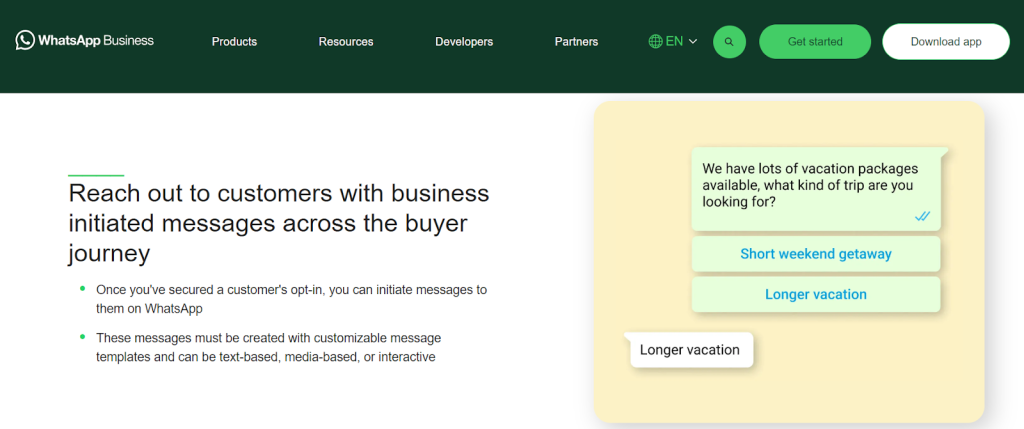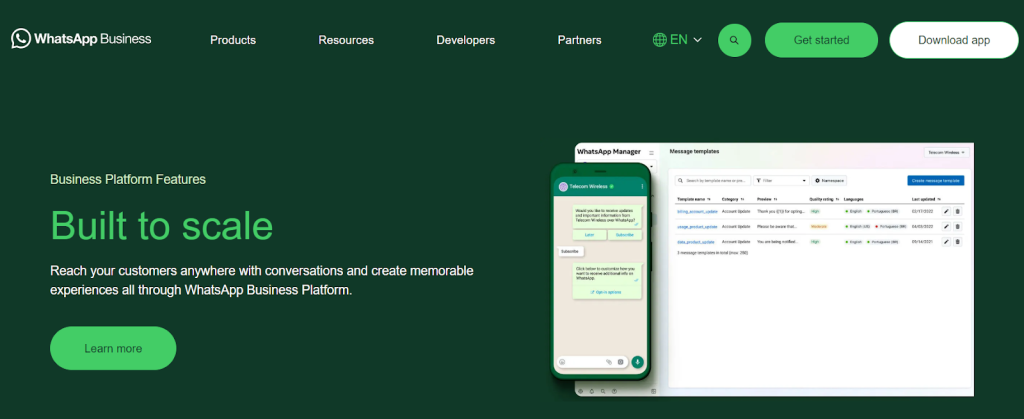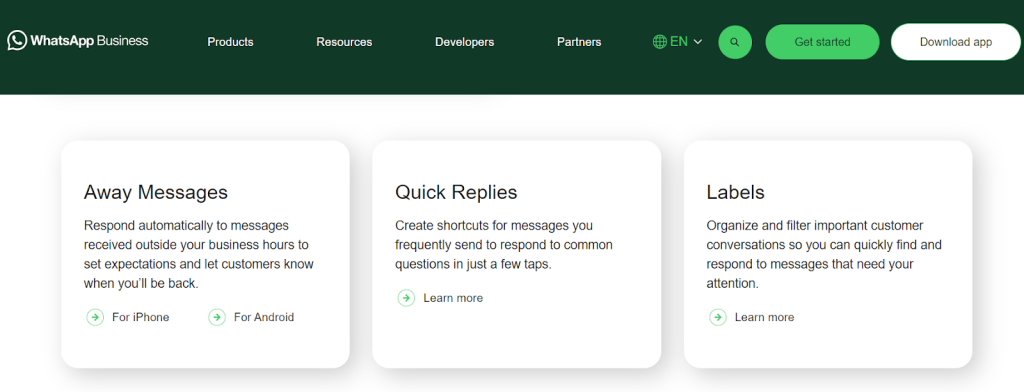In 2024, 85% of consumers say they are interested in receiving timely and proactive communications from brands on WhatsApp, making it one of the most effective channels for engagement. Furthermore, 66% of users have made a purchase after interacting with a brand on WhatsApp, showcasing the platform’s power to drive sales and build customer relationships.
Statistics also reveal that 80% of small and medium-sized businesses in India view WhatsApp as essential for business growth, from customer support to promotional updates. These trends show that WhatsApp is no longer just a messaging app; it’s a strategic tool that helps businesses connect with their audience in real-time.
In this guide, we’ll explore the latest WhatsApp marketing strategy and best practices, designed to help you create meaningful, high-impact customer interactions in 2025.
Trends in WhatsApp for Marketing
Below are some of the creative trends and ideas that show how to use WhatsApp for marketing:
AI-Powered Chatbots
Chatbots powered by AI are becoming increasingly popular for small businesses using WhatsApp marketing. These bots handle routine tasks, such as answering frequently asked questions or processing simple orders. AI chatbots offer a quick response time, which improves customer satisfaction and saves staff time. They can work 24/7, so customers get the information they need at any time. This trend is helping businesses provide fast, automated support, freeing up resources for more personalized interactions.
Interactive Content
Interactive content like quizzes, polls, and surveys is a trend that keeps customers engaged. By using interactive content, businesses can gather insights into customer preferences while making interactions enjoyable. Quizzes can introduce customers to new products, while polls help businesses understand customer opinions. This type of content drives higher engagement rates, making customers feel involved and valued.
For example, a cafe could run a poll on WhatsApp asking customers to vote on new menu items, building excitement before a launch.

Video and Voice Messaging
Video and voice messages bring a personal touch to WhatsApp marketing. Businesses are using these features to share quick tutorials, product demonstrations, or personalized thank-you messages. Video messages make it easier to explain product details, while voice messages add warmth and personality.
For instance, a clothing brand could send video clips showing different ways to style a new collection. These types of messages are more engaging than text alone, helping businesses build stronger connections with their customers.
WhatsApp Shopping
WhatsApp is quickly evolving into a shopping platform. Businesses can now integrate shopping features directly into the app, allowing customers to browse and purchase products. By creating a product catalog on WhatsApp, businesses make it easy for customers to view products, ask questions, and place orders all in one place. This trend makes WhatsApp marketing more convenient for customers, who can complete transactions without switching apps. Small businesses like boutiques or craft stores, can benefit from this trend by offering a seamless shopping experience.
Status Ads and Promotions
Many businesses are using WhatsApp Status to share promotional content. Status updates last for 24 hours, making them perfect for flash sales or time-sensitive offers. This feature is especially effective because customers who check your status are already interested in your business. By sharing updates on new products, exclusive discounts, or events, businesses can keep customers informed and drive quick action. Small businesses can use Status for flash sales, offering a limited-time discount on specific products.
Hyper-Personalization
Personalized messages tailored to customer preferences are a major trend in WhatsApp marketing. Small businesses are gathering customer data to send customized offers, recommendations, and greetings. Hyper-personalization makes customers feel seen and valued, increasing the likelihood of repeat business.
For example, a bookstore might send personalized messages recommending books based on previous purchases. This strategy improves customer loyalty and engagement by making the interactions relevant to each customer’s interests.
Influencer and Ambassador Programs
Working with influencers or brand ambassadors on WhatsApp is an emerging trend. These partnerships help businesses reach niche audiences and build trust through word-of-mouth marketing. Influencers can share product reviews, exclusive offers, or invite followers to join a WhatsApp group. This trend is particularly beneficial for small businesses targeting younger audiences.
For example, a skincare brand could collaborate with a beauty influencer to run a promotion on WhatsApp, reaching more potential customers.
WhatsApp Groups for Community Building
WhatsApp groups offer a way for businesses to create a community around their brand. By starting a group, businesses can engage with customers on a more personal level, share updates, and encourage discussions. Groups are excellent for businesses that offer recurring services or membership-based products.
For instance, a fitness trainer could create a group for clients, sharing workout tips and answering questions. This trend enhances customer loyalty by making customers feel part of a like-minded community.

Customer Feedback and Polling
Businesses are using WhatsApp to gather feedback quickly and easily. By sending short surveys or polling customers on their preferences, businesses can improve their products and services based on real customer input. Feedback loops also show customers that their opinions matter, fostering loyalty.
For example, a restaurant might ask customers to rate their experience after dining, using the feedback to refine their menu or service. This trend makes WhatsApp marketing interactive and customer-focused.
Automated Drip Campaigns
Drip campaigns on WhatsApp allow businesses to nurture leads over time with automated message sequences. These campaigns can include welcome messages, product tutorials, or seasonal promotions sent at scheduled intervals. Drip campaigns keep customers engaged without overwhelming them with too much information at once.
For example, an online learning platform could use drip campaigns to introduce new course enrollees to their offerings, guiding them through the learning experience step-by-step.
Best Practices to use WhatsApp for Marketing in 2025
Below are some unique best practices to use WhatsApp for marketing purposes:
Optimize Timing Based on User Activity
- One of the most effective best practices for WhatsApp marketing is to optimize your message timing based on your audience’s activity patterns.
- Research when your target customers are most active on WhatsApp, and plan your messages accordingly.
- Sending messages when your audience is likely to be online increases the chances of engagement.
- The best time to send messages may vary based on region or customer demographic, so tracking past message responses and conducting A/B testing can help.
- Avoid messaging during off-hours to ensure your messages aren’t ignored. By refining your timing strategy, you’ll increase the likelihood of your messages being opened and read.
Use Polls and Interactive Features to Engage Customers
- To make WhatsApp marketing more engaging, businesses should incorporate interactive elements such as polls, surveys, or quizzes.
- This approach not only boosts customer participation but also allows businesses to gather insights about their audience.
- Polls are a simple yet effective way to gauge customer preferences, conduct quick research, or measure interest in new products or services. Interactive features encourage two-way communication, making customers feel involved and valued.
- Additionally, these insights can be used to personalize future campaigns, leading to higher satisfaction rates and more relevant content for your audience.
Create Exclusive Content for WhatsApp
- Building exclusivity is key to retaining customer interest in WhatsApp marketing. Offering exclusive content that’s only available to your WhatsApp subscribers can drive higher engagement and loyalty.
- This could be early product launches, first-look updates, or special promotions tailored for your WhatsApp audience.
- Customers are more likely to interact with your brand when they feel they’re receiving something unique.
- Exclusive content encourages users to keep checking your messages and status updates regularly, reinforcing the sense of privilege and loyalty.
- This strategy is particularly useful for businesses that want to differentiate WhatsApp from their other marketing channels.
Regularly Clean and Segment Your Contact Lists
- One best practice often overlooked in WhatsApp marketing is maintaining clean and segmented contact lists.
- Over time, contact lists can become outdated with inactive numbers, leading to lower engagement rates.
- Regularly reviewing and updating these lists ensures that your messages reach a responsive audience.
- Segment your contacts based on their behaviors, demographics, and interests to send more relevant content.
- Segmented lists allow for personalized messaging that speaks to specific groups, enhancing the effectiveness of your campaigns. Additionally, managing an active and engaged list reduces the risk of being flagged as spam.
Limit Message Frequency to Avoid Overload
- It’s tempting to send frequent updates and promotions, but one of the core principles of effective WhatsApp marketing is restraint.
- Overloading your audience with too many messages can lead to frustration, and customers may choose to opt out of receiving messages altogether.
- Limiting the frequency of messages is crucial for maintaining customer engagement. Aim to provide valuable and meaningful content rather than frequent updates.
- Sending fewer but more impactful messages ensures customers look forward to hearing from you, rather than feeling overwhelmed by constant communication.
Use Data Analytics for Campaign Improvement
- Tracking and analyzing your WhatsApp campaigns is essential for understanding what works and where you can improve.
- Use WhatsApp’s data analytics, such as open rates, response times, and click-through rates, to measure the success of your messages.
- These insights can help you fine-tune your WhatsApp marketing strategy and make data-driven decisions for future campaigns.
- Regularly reviewing campaign performance helps identify patterns, allowing you to optimize content, timing, and audience targeting for maximum impact.
Focus on Delivering Value with Every Message
- Each message you send through WhatsApp marketing should deliver value to the recipient.
- Rather than focusing solely on sales pitches, aim to provide useful information, solutions to problems, or engaging content that meets customer needs. Messages that offer value will build trust and strengthen your relationship with the customer.
- Whether it’s offering tips, exclusive deals, or updates, make sure that each interaction is purposeful. This approach increases the chances of customer retention and enhances the overall user experience, which is critical for long-term business success.
Encourage User-Generated Content
- Encouraging customers to share their own experiences with your brand via WhatsApp is an excellent way to build trust and engagement.
- User-generated content (UGC) is authentic and can serve as social proof, making other potential customers more likely to trust and engage with your business. Invite your customers to share testimonials, photos, or videos of them using your products or services.
- This content can be featured in your WhatsApp status updates or shared in one-on-one chats. UGC helps build community and makes customers feel like they’re part of your brand’s journey, enhancing loyalty.
Use Automation Sparingly and Effectively
- While automation can help streamline processes, it’s important to use it sparingly in WhatsApp marketing.
- Automating responses for FAQs or initial interactions is useful, but over-automation can lead to impersonal interactions that disconnect the customer.
- Make sure that automated messages feel as human as possible, and follow up with personalized responses when appropriate.
- Automation should complement, not replace, personal engagement. By balancing automation with real-time interaction, you can provide efficient customer service while maintaining a personal touch.
Be Responsive and Prioritize Two-Way Communication
- WhatsApp marketing is not just about broadcasting messages; it’s about creating two-way communication.
- Businesses that prioritize responsiveness and customer engagement will see higher success rates.
- Responding to customer inquiries, feedback, and comments promptly helps build trust and shows that you value their input. When customers feel heard, they are more likely to engage with your brand and remain loyal.
- Two-way communication also allows businesses to gather real-time insights and address any concerns quickly, leading to a more satisfying customer experience.
Integrations Available for WhatsApp Business Marketing

There are a variety of integrations available for both the WhatsApp Business App and API, making it easier for businesses to incorporate WhatsApp into their existing marketing workflows:
- Social Media Platforms: Integrate WhatsApp with Facebook and Instagram. Businesses can add a WhatsApp button to their Facebook page or Instagram profile, directing customers to chat instantly.
- Website Integration: With the WhatsApp Click-to-Chat feature, you can create a link or button on your website, allowing visitors to open a WhatsApp chat with your business directly. This is useful for customer inquiries and live support.
- Customer Service Platforms: Integrate WhatsApp with customer service tools like Zendesk or Freshdesk to manage customer support tickets and interactions across multiple channels from a single dashboard.
- eCommerce Platforms: Integrations with platforms like Shopify and WooCommerce allow businesses to send order updates, abandoned cart reminders, and promotional offers to customers on WhatsApp. This enhances customer engagement and improves sales conversion rates.
- Marketing Automation Tools: Connect WhatsApp with tools like HubSpot or Zoho CRM for automated lead nurturing, follow-ups, and personalized messaging. These integrations allow businesses to manage customer relationships more effectively and use WhatsApp as part of their broader marketing automation strategy.
- Payment Platforms: Some BSPs allow businesses to integrate WhatsApp with payment solutions so customers can complete purchases directly through the app. This is useful for small businesses looking to streamline the checkout process.
Wrapping Up
WhatsApp marketing is a powerful tool for businesses to connect with customers in a direct and personal way. By staying updated on the latest trends and applying best practices, you can make the most out of this platform. These strategies help you engage customers more effectively, build loyalty, and increase conversions.
Now is the time to start exploring these tools and techniques for your business. With consistent effort, you’ll see the benefits of WhatsApp for marketing. Use the flexibility of WhatsApp to create genuine interactions, and watch your customer relationships thrive.